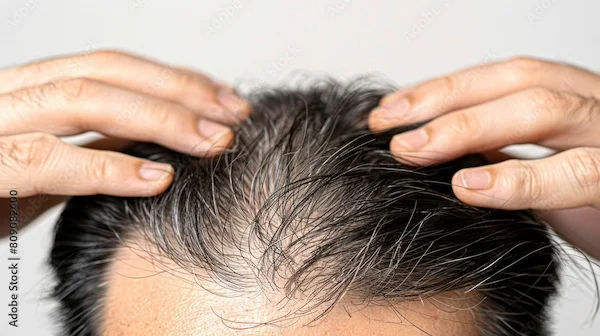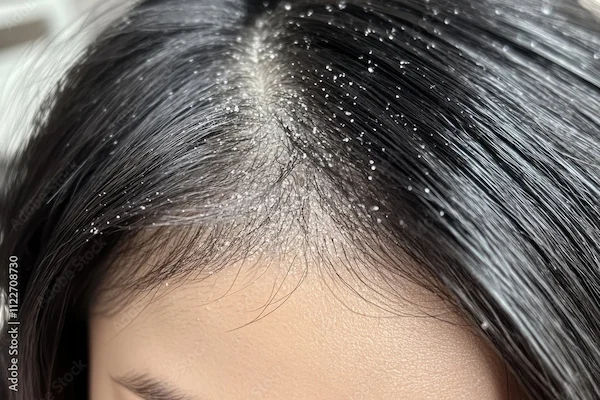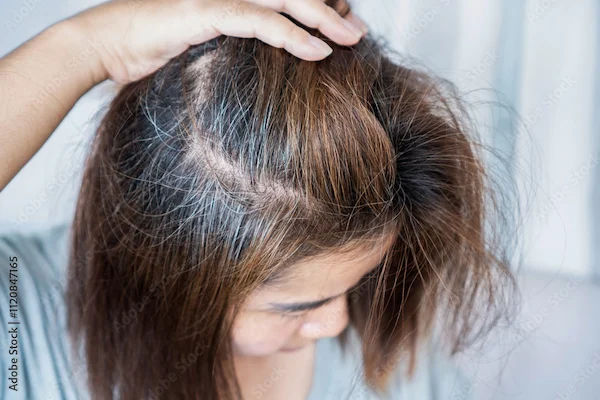How to Reduce DHT Level In Scalp Naturally?
Reduce DHT levels in the scalp naturally with diet, herbs, essential oils, and lifestyle changes. Support healthy hair growth and prevent hair thinning effectively.

Written by Dr. Sonia Bhatt
Last updated on 3rd Jul, 2025

Introduction
Are you noticing thinning hair or excessive shedding? If so, you’re not alone. One of the main culprits behind hair loss is dihydrotestosterone (DHT), a hormone that directly affects your hair follicles. When DHT levels rise, they bind to your follicles, causing them to shrink and weaken. Over time, this shortens your hair’s growth cycle, leading to thinner strands and eventual hair loss, especially if you have a genetic predisposition to male or female pattern baldness.
DHT is a byproduct of testosterone and plays an important role in your body. However, when too much of it accumulates, it disrupts your hair’s natural growth cycle, making follicles smaller and hair more fragile. You may notice its effects most around your crown and hairline, where high DHT levels are known to accelerate hair loss.
The good news is that you can take steps to manage DHT levels naturally and support healthier hair regrowth. Simple lifestyle changes such as improving your diet, using herbal remedies, and adopting proper scalp care can help protect your hair without unwanted side effects. By making these adjustments, you can strengthen your follicles and maintain a fuller, healthier head of hair.
Natural Hair Growth and DHT
Maintaining healthy hair requires a balance between hair growth and hormonal activity. Dihydrotestosterone (DHT) is one of the key hormones that affect your hair follicles. But when their levels are too high, it can lead to hair thinning and loss. Understanding how DHT impacts hair health and how natural remedies can help control it is essential for promoting stronger, healthier hair.
1. How DHT Affects Hair Follicles?
DHT binds to receptors in your scalp and causes follicle miniaturisation. It is a process where your hair follicles shrink and produce thinner, weaker strands. Over time, this leads to shorter hair growth cycles and eventually prevents new hair from growing. Areas like the crown and hairline are especially vulnerable to DHT-induced hair loss.
2. The Role of Natural Remedies in Balancing DHT
Reducing DHT naturally involves a combination of nutrient-rich foods, herbal extracts, and scalp care techniques. Natural DHT blockers like saw palmetto, pumpkin seed oil, and green tea can help inhibit the conversion of testosterone into DHT. Maintaining a healthy diet, improving circulation through scalp massage, and reducing inflammation also support hair follicle health and encourage regrowth without needing medications.
Diet and Nutrition
What you eat plays a crucial role in managing DHT levels and promoting healthy hair growth. Certain foods contain natural DHT blockers that help prevent hair follicle shrinkage, while essential nutrients support strong and thick hair.
1. Foods That Help in Reducing DHT Naturally
Eating a DHT-balancing diet may slow down your hair loss and strengthen your hair follicles. Some of the best foods for reducing DHT include:
Pumpkin seeds and flaxseeds – These are rich in zinc and lignans which block DHT production
Green tea – It contains catechins that help inhibit DHT conversion
Soy products – These are high in isoflavones that may reduce DHT effects
Nuts (almonds, walnuts) – Nuts provide biotin and essential fatty acids for hair strength
Leafy greens (spinach, kale) – These are rich in magnesium that helps regulates your testosterone and DHT levels
2. Nutritional Supplements for Hair Health and DHT Reduction
Taking supplements can support DHT reduction and hair regrowth if your diet lacks key nutrients. Some beneficial options include:
Saw palmetto extract – A well-known natural DHT blocker
Biotin – Strengthens hair strands and improves follicle health
Zinc and magnesium – Help regulate hormones and prevent excess DHT production
Omega-3 fatty acids – Reduce inflammation and nourish the scalp
By maintaining a balanced diet and taking the right supplements, you can naturally support hair health while keeping DHT levels under control.
Herbal Remedies and Essential Oils
Natural herbs and essential oils have been used for centuries to promote hair growth and combat hair loss. Many of these remedies work by blocking DHT production, improving scalp circulation, and strengthening hair follicles. Incorporating them into your hair care routine can support healthier, thicker hair naturally.
1. Popular Herbs for DHT Reduction
Certain herbs contain active compounds that help inhibit 5-alpha reductase, the enzyme responsible for converting testosterone into DHT. Some effective herbs include:
Saw palmetto – One of the most powerful natural DHT blockers
Pumpkin seed extract – Reduces DHT levels and promotes hair regrowth
Nettle root – Helps prevent follicle shrinkage caused by DHT
Green tea extract – Contains catechins that block DHT conversion
2. Essential Oils to Promote Hair Growth and Reduce DHT Levels
Massaging essential oils into your scalp can improve blood circulation and support follicle health. Some beneficial oils include:
Rosemary oil – Stimulates hair growth and reduces DHT impact on follicles
Peppermint oil – Improves scalp circulation and strengthens roots
Lavender oil – Helps balance hormones and reduce inflammation
Pumpkin seed oil – Blocks DHT and nourishes the scalp
By incorporating these herbs and essential oils into your hair care routine, you can naturally lower DHT levels and encourage stronger, healthier hair growth.
Lifestyle Adjustments
Your daily habits play a significant role in regulating DHT levels and maintaining healthy hair. Exercise and stress management are two key factors that influence hormone balance, scalp circulation, and overall hair health. By making small lifestyle changes, you can naturally reduce DHT-related hair loss and support stronger hair growth.
1. Exercise and Its Effects on DHT Levels
Regular physical activity helps balance hormone levels and reduce excess DHT production. High-intensity workouts, such as weight training, can sometimes increase testosterone, which may convert into DHT. However, moderate exercises like yoga, brisk walking, and cardio help regulate hormones, improve blood circulation to the scalp, and reduce inflammation, promoting healthier hair follicles.
2. Stress Management Techniques to Support Hair Health
Chronic stress triggers cortisol production which can increase DHT levels in your scalp and lead to hair loss. You can practise relaxation techniques like meditation, deep breathing, and mindfulness to lower stress. Engaging in hobbies, maintaining a proper sleep schedule, and reducing caffeine intake can also help balance your hormones and support a DHT-friendly environment for hair growth.
Home Remedies
Dealing with hair thinning and excessive hair fall can be frustrating, but natural home remedies can help reduce DHT levels in your scalp and promote healthier hair growth. By using DIY hair masks and scalp treatments, you can nourish hair follicles, improve blood circulation, and block excess DHT production.
1. DIY Hair Masks for Scalp Health
If you want to strengthen your hair and reduce the effects of DHT, incorporating hair masks into your routine can be highly beneficial. Some easy-to-make options include:
Pumpkin seed oil and aloe vera mask – Helps soothe your scalp while acting as a natural DHT blocker.
Fenugreek and yogurt mask – Strengthens hair follicles, reducing breakage and hair fall.
Green tea and honey rinse – Provides antioxidants to protect your hair from DHT-related damage.
2. Natural Scalp Treatments to Lower DHT Levels
Taking care of your scalp is just as important as nourishing your hair. If you want to naturally inhibit DHT production, try these simple scalp treatments:
Apple cider vinegar rinse – Balances your scalp’s pH, preventing excess oil build-up that can trap DHT.
Onion juice treatment – Improves blood circulation and strengthens your hair roots.
Rosemary oil scalp massage – Stimulates hair growth and helps block DHT effectively.
Supportive Therapies
Are you looking for additional ways to manage DHT-related hair loss naturally? Along with diet and topical treatments, supportive therapies like scalp massage and acupuncture can help improve blood circulation, promote hair regrowth, and create a healthier scalp environment. Adding these techniques to your routine can further support DHT reduction and strengthen your hair follicles.
1. Scalp Massage Benefits and Techniques
Massaging your scalp daily can help stimulate hair growth by improving blood flow to the hair follicles. If you want to make the most of scalp massage, follow these simple steps:
Use your fingertips or a scalp massager to apply gentle pressure in circular motions.
Add essential oils like rosemary or peppermint, which are known for their DHT-blocking properties.
Massage for 5–10 minutes daily to improve circulation and nourish hair roots.
2. The Role of Acupuncture in Hair Loss Management
If you are open to trying alternative therapies, acupuncture may help manage DHT-related hair thinning. This ancient technique works by:
Stimulating specific pressure points that enhance blood flow to your scalp.
Regulating your hormones, potentially reducing excess DHT production.
Lowering your stress and inflammation.
Personalised Approaches
Everyone’s hair loss journey is unique, and what works for one person may not work for another. If you want to effectively manage DHT-related hair thinning, identifying your personal triggers and customising your approach can help you achieve the best results. You can create a routine that works specifically for you by understanding what affects your DHT levels.
1. Identifying Individual Triggers for DHT Fluctuations
Your lifestyle, genetics, and health conditions all influence DHT production. If you are noticing hair loss, consider:
Dietary habits – Are you consuming foods that promote DHT production, such as processed or high-fat foods?
Hormonal balance – Are stress, poor sleep, or medical conditions affecting your testosterone and DHT levels?
Hair care routine – Are you using products that clog hair follicles or contain harmful chemicals?
2. Tailoring Your Routine for Optimal Results
Customising your approach is key if you want to lower DHT naturally. You can:
Adjust your diet by including more DHT-blocking foods like green tea, nuts, and leafy greens.
Use the right treatments such as herbal remedies, scalp massage, or essential oils.
Adopt stress management techniques to reduce cortisol, which influences DHT levels.
Potential Side Effects and Considerations
While reducing DHT levels naturally can support hair growth, it is important to be aware of potential side effects. Balancing DHT production without disrupting overall hormonal health is key to achieving long-term results safely. Understanding possible unwanted effects and following safety precautions can help you maintain a healthy scalp while avoiding complications.
1. Recognising Unwanted Effects of DHT Reduction
You may experience the following effects if you lower DHT levels too much:
Decreased libido or hormonal imbalances due to disrupted testosterone conversion
Weaker facial and body hair growth in some individuals
Changes in mood or energy levels if hormonal fluctuations occur
2. Safety Tips for Using Natural Remedies
If you are incorporating herbal remedies, dietary changes, or essential oils into your routine, keeping a balanced approach is essential. To minimise your risks, you should:
Avoid overusing DHT-blocking supplements—stick to recommended dosages.
Monitor for side effects like scalp irritation or unexpected hormonal changes.
Consult a healthcare professional before making significant dietary or lifestyle changes, especially if you have underlying health conditions.
Conclusion
Managing DHT levels in the scalp naturally can help slow hair loss and promote healthier hair growth. Effective methods include a nutrient-rich diet, herbal remedies, essential oils, scalp massage, and stress management. Making small yet consistent changes to your routine can create a healthier scalp environment and support strong hair follicles.
Taking a holistic approach to hair care by focusing on diet, lifestyle, and personalised treatments can yield better results over time. By implementing these natural strategies, you can work towards healthier, thicker hair. If hair loss persists, consulting a professional can help tailor a solution that suits your specific needs.
Consult Top Dermatologist
Consult Top Dermatologist

Dr. K Chetana
Dermatologist
10 Years • MBBS, MD ( Dermatology)
Hyderabad
Apollo 24|7 Clinic, Hyderabad

Dr Usha B K
Dermatologist
4 Years • MBBS,MD (Dermatology, Venereology & Leprosy), DNB (Dermatology, Venereology & Leprosy), Fellowship in Trichology
Bangalore
Apollo 24|7 Clinic - Karnataka, Bangalore
(50+ Patients)

Dr. Hemalatha Naidu M
Dermatologist
5 Years • MBBS, MD (Dermatology)
Bangalore
Apollo 24|7 Clinic - Karnataka, Bangalore
(275+ Patients)

Dr. Imran Ali
Dermatologist
12 Years • MBBS ,MD
Hyderabad
Dermax Skin & Hair Transplant Clinic, Hyderabad

Dr. Shilpa Nikam
Dermatologist
8 Years • MBBS, DDVL, PGDMC
Bengaluru
A1 AESTHETIC Skin and Hair Clinic, Bengaluru
(25+ Patients)


